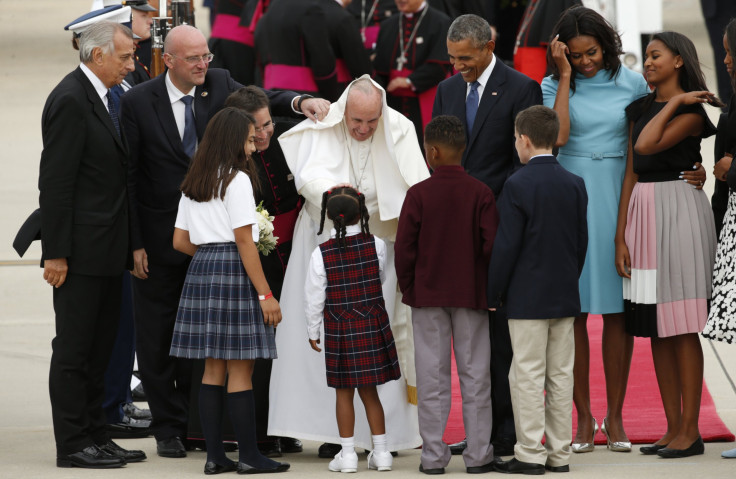Pope Francis Brings Message About Power And The Poor To US

Pope Francis arrived on his first visit ever to the United States on Tuesday, bringing to Washington a message that its power and wealth should be used to serve humanity.
Bestowing on Francis an honor that few foreign dignitaries receive, both President BarackObama and Vice President Joe Biden personally greeted the 78-year-old Argentine on the tarmac after the Alitalia papal plane landed at Joint Base Andrews near the capital.
Schoolchildren cheered the pontiff in his first moments on U.S. soil, chanting "Hello, hey, hey, welcome to the USA."
Obama, his wife Michelle Obama and their daughters shook the pope's hand on the red carpet.
The six-day visit to America gives Francis an opportunity to deliver his message of compassion and simplicity to the world's richest and most powerful country.
Francis ended a four-day Cuba trip and headed to the United States with a message of reconciliation for the former Cold War foes while avoiding controversy on the U.S. trade embargo or human rights on the Communist-run island.
The first Latin American pope has electrified liberal-leaning U.S. Catholics, Democrats and many non-Catholics with a shift in emphasis toward concern for the poor and immigrants and his appeals for action against climate change. But his criticism of unbridled capitalism has unsettled U.S. conservatives.
In keeping with his unpretentious style, the pontiff left the air base headed for Washington in a small Fiat car, in contrast to the long motorcades of large SUVs used by U.S. presidents.
Francis will give the first speech by any pope to the U.S. Congress on Thursday, an address to the U.N. General Assembly in New York on Friday and an open-air Mass in Philadelphia where 1.5 million people are expected to attend.
The leader of the world's 1.2 billion Roman Catholics, whom conservatives have accused of being too liberal, said his pleas for social justice were based on Church teachings.
'ECONOMIC IMPERIALISM'
"I am sure that I have not said anything more than what is in the social doctrine of the Church," he told reporters on the plane carrying him from Cuba.
"My doctrine on all this ...on economic imperialism, is that of the social doctrine of the Church," said Francis.
"If you want me to read the Creed, I can," he told a reporter who asked about the criticisms, referring to the prayer of Catholic beliefs said in the Mass.
It is unclear what kind of tone he will strike while in the United States, a country he has never visited despite his extensive travel and his Church leadership positions before becoming pope in 2013.
On the plane from Cuba, Francis told reporters he hopes the United States will lift its long trade embargo on the Communist-run island as a result of negotiations between the two countries but does not plan to raise it in his address to Congress this week.
"My desire is that they end up with a good result, that they reach an accord that satisfies both sides, an accord, certainly," said Francis, who helped broker a thaw between the two countries after more than five decades of conflict.
His decision to go from Cuba to the United States is weighed with symbolism as the pope pushes the Church to pay greater heed to people who live on the periphery.
Obama and the pope meet more formally on Wednesday at the White House where the atmosphere is likely to be cordial.
"I think that you can say that both President Obama and Pope Francis, have, over the course of their careers, both demonstrated a commitment to values related to social and economic justice," White House spokesman Josh Earnest told reporters.
After the meeting, Francis will then parade past Washington's major monuments before a crowd expected to reach tens of thousands.
A poll on Monday showed that 51 percent of Americans viewed Francis favorably, with just 9 percent of respondents to a MSNBC/Telemundo/Marist poll reporting an unfavorable view.
U.S. Republicans, who control Congress, often struggle to agree with Francis' economic messages. But they applaud him for defending Church teachings that oppose abortion and same-sex marriage.
(Additional reporting by Roberta Rampton at Joint Base Andrews; Writing by Alistair Bell; Editing by Mary Milliken, Grant McCool and Lisa Shumaker)
© Copyright Thomson Reuters {{Year}}. All rights reserved.





















